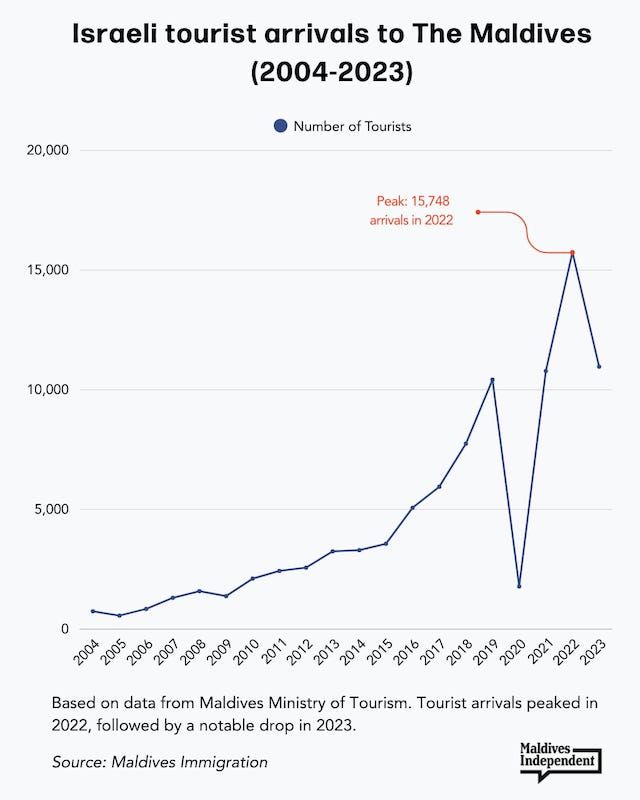Under pressure: Maldives rushes Israel passport ban after 300-day delay
The enforcement came days before a protest march.

Artwork: Dosain
23 Apr 2025, 19:19
The backpedaling was immediate. The retreat took mere days as bold promises met reality. Soon after the government’s headline-grabbing announcement in June last year that President Dr Mohamed Muizzu has “resolved to ban the Israel passport,” the attorney general demurred over a blanket ban that would cover nearly two million Palestinians.
As the ruling party leadership advocated for a targeted ban on Israeli leaders and the tourism lobby warned of damage to the prized Maldives hospitality brand, a bill to bar entry to Israeli passport holders languished in a parliamentary committee for more than 300 days.
Instructions to fast-track the bill came during the second week of April, a senior political officer at the President’s Office told the Maldives Independent.
“Government officials met with interest groups who were lobbying for the ban and with a big public protest march coming up, there was a lot of pressure for immediate action and a message that this cannot be delayed any longer,” the official said.
Three days after the enforcement of the ban, hundreds of people marched down Majeedhee Magu, the capital’s main thoroughfare, condemning Israeli atrocities in Gaza and decrying the silence of the Muslim community in the face of the ongoing slaughter of innocents. Placards reminded Maldivians to shun the products and companies listed by the Boycott, Divest and Sanction movement.
“You can imagine what those placards would have said on Friday night, if the ban had not been introduced by then. It would have looked more like a protest against the government as well,” the President’s Office official explained.
The sudden enforcement of the ban did not come as a surprise to activists who have been calling for decisive action since Israel launched the military offensive in Gaza in October 2023.
“I think the public pressure was getting to a level that holding on to this for any longer would damage the government. They tried their best to delay it with all these excuses,” said a 32-year-old man who is a part of a youth action group for BDS in the Maldives.
“There are only a few issues I think the public would agree on and this is one of them. How long could they have delayed it?”
Starting in late 2023, the Youth for Unity group conducted weekly protests calling for a boycott of the KFC and Pizza Hut outlets in Malé, both of which were shut down in January.
“It is a bold gesture. We have always championed the Palestinian cause and this time, with action, we are reiterating that,” a senior foreign ministry official told the Maldives Independent.
“Despite a UN special committee finding that Israeli atrocities in Gaza and the suffering unleashed on the Palestinian people is an ongoing genocide, we see no action on the global stage. Maldives might be small and this ban might be negligible in that global picture, but it sends a strong message.”
Diluted measure
MP Meekail Naseem, who sponsored the bill for the Israel passport ban in May 2024, also suggested that the decision followed government officials meeting with the activist groups, “who said they were planning a big protest because of the delay.”
“On top of mounting public pressure, I think that is what forced their hand,” the opposition Maldivian Democratic Party lawmaker said.
Meekail accused the ruling People’s National Congress supermajority of “watering down” the bill by scrapping the original provision that sought to bar entry to all Israeli citizens, regardless of whether they hold dual nationality.
The change was made after Immigration informed the committee that it lacked the means to confirm dual citizenship when visitors present their passport. “Until the inhumane actions carried out by Israel against Palestinian citizens since 7 October 2023 comes to a stop, entering the Maldives with an Israeli passport is prohibited,” reads the new provision added during the committee stage.
“The whole point of the bill was to sanction individuals who are perpetrators of this genocide, inclduing IDF soldiers. The way the phrasing of the bill has been changed, I do not think it carries the same weight. Dual passport holders can still enter the country,” Meekail told the Maldives Independent.
The imprecise language could pose legal challenges for enforcement, he argued.
“Another thing added to the phrasing is ‘until the attacks stop’ which is very vague and doesn’t clearly state who and what decides that attacks have stopped. If the Israelis call a ceasefire, does that mean the condition in the bill has been met and Israelis will be allowed entry again? We know Israel routinely violates ceasefire arrangements,” he said.
About 10 percent of the Israeli population is estimated to hold dual nationality.
According to the Institute for Middle East Understanding, 1.9 million Palestinians hold Israeli citizenship. Despite the government citing the figure as a key reason for reconsidering the ban, the issue was not addressed through amendments as promised by the attorney general.
The announcement of the ban in June 2024 – which garnered international attention and created the false perception that a ban was already in effect – came at the peak of the public outcry over the carnage in Gaza. The ban was a key demand of a demonstration outside parliament amid fundraising efforts and protest marches over the rising death toll in the besieged enclave.
But Israeli tourists continued to arrive. Since June 2024, 934 tourists with Israeli passports have visited the Maldives, according to Maldives Immigration data. However, Israel does not constitute a major source market, accounting for only 0.58 percent of total arrivals in 2023, a decline from a peak of 15,748 in 2022.

Discussion
No comments yet. Be the first to share your thoughts!
No comments yet. Be the first to join the conversation!
Join the Conversation
Sign in to share your thoughts under an alias and take part in the discussion. Independent journalism thrives on open, respectful debate — your voice matters.




